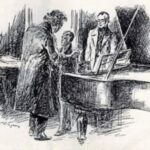The choice of word ‘recognized’ is very important here! By all means, to answer the question truthfully, we have to imagine a very different world compared to the one we live in today. Today, we have celebrities, which in other words means high visibility in the media. We may find famous people, as well, they are not necessarily visible, but definitely well known in certain groups, like a Nobel-prize winner for academics.
In Beethoven’s time there was no mass media. Local newspapers yes, but to send information from one city to the next, one had to rely on postal horse carriages. People spent more time on providing food for dinner and less on listening to news. If they did, it happened in local communities, like a tavern in the village, coffee house in Vienna or a posh top ten percent party at a noble house. In other words life was much slower.
Music was not public in Beethoven’s time. Listening to music on regular basis (which could only be live music) was accessible only for the rich (almost always aristocracy in this period). They often had their private orchestra with musicians doubling for some other duties around the house. Being a famous musician or get recognition could primarily be at, and come from, this social class.
Finally, the musicians. Europe was a free continent for movement and artists often traveled, toured or moved among major European cities. In music, Vienna was the most important city, the capital of music. If a musician was somebody in Vienna, he was important on the whole continent, as fellow professionals carried their impressions as they visited other countries.
After describing the important historical background of fame and recognition, here are 10 facts to prove that Beethoven was famous and recognized even in his lifetime.
1. Beethoven was spotted as a special talent, even as a child. Most certainly, Beethoven was not a child prodigy comparable to Mozart and many other Wunderkind, but his talents were universally recognized by everyone who witnessed him play and later compose his first works as a teenager. So much so, that the Elector of Bonn and a wealthy and influential patron (Waldstein) arranged and financed his studies with Haydn, the biggest name in music at the time.
2. Even at his early stage of his career he was already known in many European cities, like Prague or Berlin, and was invited to play and often to stay longer.
3. Beethoven composed only one opera, Fidelio, a work he was never satisfied with completely. The payment for the score was more than what Mozart (the opera king) ever received for any of his opera compositions.
4. Vienna was the center of power, the capital of the empire with some very serious and heavy-weight aristocracy and royalty. From day one many of his friends and patron were coming from this circle and they did and endured (Beethoven was not an easy person, with regular tantrums) everything just to be close to the light and beauty of his music. It often happened, that visitors even from nobility, whom he locked out or they did not want to disturb him, sat in the stairway in front of his apartment, just to listen to him play or improvise inside.
5. It is a well documented fact that Beethoven was known and respected among music aficionados and musicians all over Europe, from Moscow to London, from Berlin to Milan. His fame and his music scores reached these cities and music communities.
6. König Lustig (King Marry), brother of Napoleon, Jérôme Bonaparte the king of Westphalia tried to bait Beethoven to join his court and be his (well paid) director of music.
7. As a pre-emptive move for the invitation in the previous point, Viennese patrons and even Archduke Rudolph (half brother of the reigning emperor Franz I.) made an alliance and offered Beethoven a hefty 4 000 florins annuity, just to stay in Vienna.
8. Beethoven was not only the music teacher of the above mentioned Archduke Rudolph, but they were on friendly terms. We also know, that he was known and well received regular guest at the imperial family.
9. At the premier of his last symphony, the Ninth, there was unprecedented applause and ovation. According to recollections the audience broke out in applause and standing ovations five times, which was unprecedented, given that it was customary to give three ovations for the imperial couple.
10. Finally, three quotes from three superior musicians, how they saw and regarded master Beethoven.
Johannes Brahms refused to compose a symphony for 21 years, saying “I shall never write a symphony, you have no idea how the likes of us feel when we hear the tramp of a giant like him [Beethoven] behind us!”
Franz Liszt regarded his meeting with Beethoven as a young boy, his greatest pride, saying “This event in my life has remained my greatest pride—the palladium of my whole career as an artist. I tell it but very seldom and—only to good friends!”
Finally, Rossini made sure that he pays respect to the famous composer, when he was visiting Vienna. After the meeting he remembered the impact of Beethoven, reporting “I stood before him, like a butterfly before a lion!”





